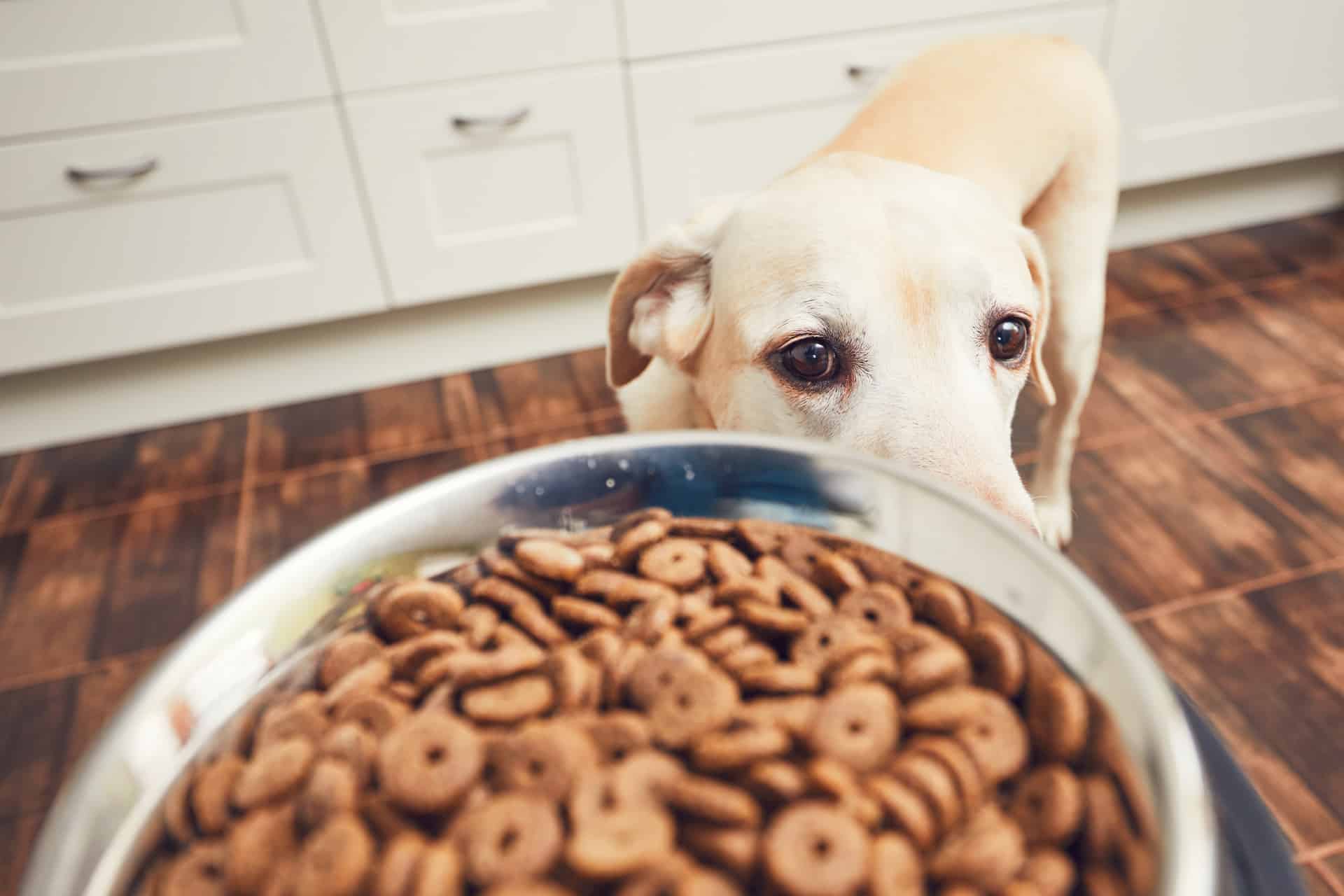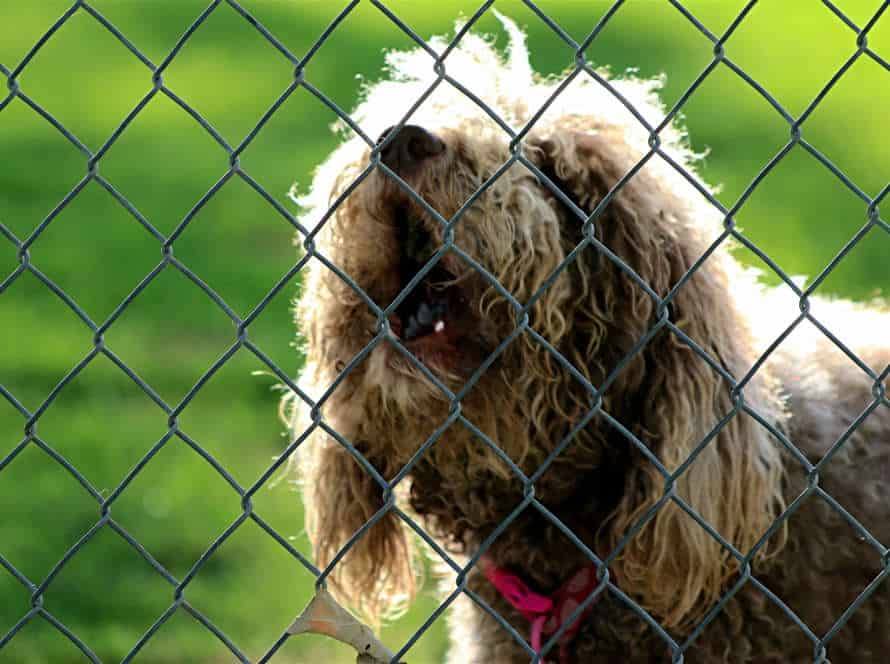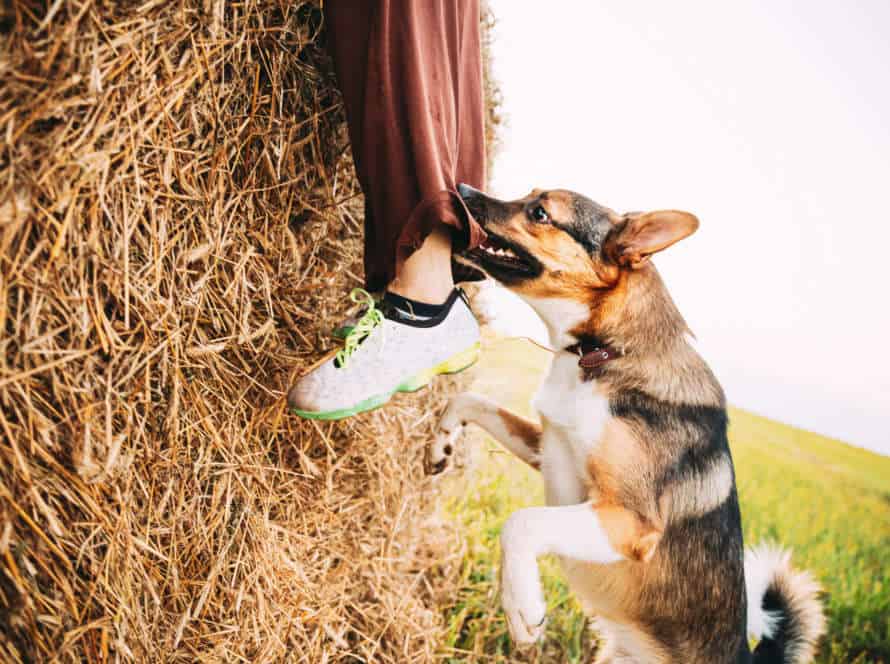The Impact of Diet on Aggressive Behavior in Dogs
Diet has a big impact on controlling and maybe even reducing violent behavior in dogs. Scientists studied the connection between diet and aggressive behavior in dogs.
High protein, low carb diets, can help stop aggressive behavior in dogs. This is since it balances their blood sugar levels and moderates their emotions. Steer clear of food with added preservatives and fillers, as these may worsen aggressive behavior. It’s advised to change your dog’s diet to a high-quality one with plenty of lean meats, veggies, and moderate quantities of carbohydrate-rich grains such as rice, oats, or quinoa.
Besides diet, providing training, exercise, and a peaceful, healthy environment can help manage aggressive behavior in dogs. Consult a professional animal behaviorist for a comprehensive check and diagnoses.
Understanding Aggressive Behavior in Dogs
Managing aggression in dogs can be tricky. To do it successfully, it’s essential to recognize the root cause. Diet has a big influence on aggressive behavior in pooches, so it’s smart to be aware of how nutrition affects them. Let’s examine the effects of diet on aggressive behavior in dogs in this article.
Different Types of Aggressive Behavior
Aggressive behavior in dogs is classified into different types, depending on the cause and how it’s expressed. Let’s look at some of them:
- Fear Aggression: Dogs bark or bite when feeling threatened or scared.
- Dominance Aggression: This type appears when a dog tries to be dominant over its owner or other dogs.
- Territorial Aggression: To protect their territory, dogs might become aggressive to strangers or animals that try to get near it.
- Pain Aggression: When in pain or having a medical issue, a dog can show aggressive behavior to people or other animals.
- Redirected Aggression: This happens when a dog can’t get to its intended target and attacks someone or something else.
Knowing the types of aggressive behaviors in dogs can help you prevent or manage them. A high tryptophan and low protein diet could also reduce aggressive behavior.
Causes of Aggressive Behavior in Dogs
Aggressive behavior in dogs can have various causes. Genetics, past experiences, and underlying health conditions are all factors.
Diet also has a major impact. Lack of essential nutrients, such as protein and tryptophan, can affect brain function and mood, leading to aggression. High carbohydrate diets can cause blood sugar spikes, resulting in mood swings and irritability, which can lead to aggression. A diet too low or too high in fat can also have an effect. Food allergies and intolerances can cause gastrointestinal distress, which may increase aggression.
Providing a nutritionally complete diet is key in lowering the risk of aggressive behavior. If you think your dog’s diet may be causing aggressive behavior, consult a vet.
The Role of Nutrition in Aggressive Behavior
Nutrition is key for controlling aggressive behavior in dogs.
A nutritious diet helps to reduce stress and anxiety, ease digestion issues and improve physical and mental health.
Low-grade food lacking essential vitamins and minerals can cause nutritional deficiencies resulting in irritability, mood swings and aggression.
An uneven balance of omega-3 and omega-6 fatty acids can cause inflammation and influence brain activity, leading to attitude and behavior changes.
Processed and artificial food ingredients can cause digestive troubles, leading to agitation, irritation and aggression.
Feeding your pup a healthy diet packed with protein, fiber, vitamins and minerals will reduce stress levels, promote relaxation and encourage positive behavior. Pro Tip: Contact a vet or animal behaviorist to decide the best diet for your pup’s individual needs.
Essential Nutrients for Dogs
A balanced diet is key for a dog’s health and behavior. To lower aggression, essential nutrients must be included. Here, we’ll look into what these essential nutrients are, so dogs can maintain a healthy lifestyle and reduce aggression.
Protein
Protein is a must-have nutrient for dogs. It builds up their muscles, bones, skin, and hair. They need a healthy diet with quality protein to stay in good health and have good behavior. A protein-deficient diet can make them weak, lazy, and more prone to sickness.
Studies also show that diet can affect dog behavior, including aggression. High-protein diets can reduce aggressive behavior by balancing blood sugar levels and increasing the production of brain chemicals that make them calmer and more relaxed.
Pro tip: Check with your vet to know the best protein requirements for your dog’s breed, age, and activity level. This will help them stay healthy and happy.
Carbohydrates
Carbs are important for doggies. They offer energy, fiber, and vitamins and minerals. But, too much can cause weight problems and health issues.
The correct balance of carbs, protein, and fat can help a pup’s aggressive behavior. Not having enough nutrients and too much carbs can cause blood sugar to go up and down, making them moody and crabby.
Consult a vet to know what type and how much carbs to give, based on the pup’s age, breed, and activity level. Pro Tip: Make their meals at home with sweet potatoes, brown rice, and veg for essential carbs.
Fats
Fats are essential for dogs’ health. But, their effect on behavior, especially aggression, is a hot topic among pet owners and animal experts. Here’s what you should know:
- Fat is a key part of a dog’s diet, giving them energy and helping with vitamin absorption.
- Some studies link high-fat diets to higher aggression and hyperactivity in dogs.
- It’s best to talk to a vet or nutritionist to decide the right fat amount and type for a dog, depending on age, breed, and activity level.
- Plus, adding healthy fats like fish, chicken, and plant-based oils can help keep your dog healthy and reduce aggression risks.
Vitamins and Minerals
Dogs need a diet rich in vitamins and minerals to stay healthy. Lack of essential nutrients can cause health problems, like developmental delays, weaker immunity, and chronic diseases.
Some important vitamins and minerals for dogs:
- Vitamin A: For eye and skin health, immunity, and bone growth.
- Vitamin C: To prevent cell damage and help immunity.
- Vitamin D: For strong bones and teeth, and to absorb calcium and phosphorus.
- Iron: For energy, oxygen transport, and immunity.
- Zinc: For skin and coat, immunity, and metabolism.
Plus, diet affects a dog’s behavior, including aggression. A balanced diet can help control mood and behavior, and reduce aggressive behavior.
Tip: Have a vet review your dog’s diet to make sure it’s balanced and right.
The Effect of Diet on Aggressive Behavior
Dogs are social critters. How they’re treated affects their behaviors. Diet can be a big factor – it can even change aggression. Studies show that when on a special diet, dogs display altered aggressive behavior. Here, we investigate the effects of diet on aggression in dogs.
The Importance of Balance in Nutrition
A balanced diet is key for optimal health in humans and animals. A diet lacking balance can bring on negative effects. This includes aggression in dogs.
Poor-quality diets or lack of nutrition can lead to behavioural problems, such as aggression to people or other animals. That’s because it changes brain chemistry, upsetting mood and behaviour.
On the flip side, a balanced diet with essential nutrients can help positive behaviour and reduce aggression. For instance, diets with protein, omega-3 fatty acids, and antioxidants may lift their mood and guard against stress.
It is vital to make sure your dog’s diet is nutritionally balanced and covers their daily needs. This not only boosts their health but also enhances behaviour and boosts their quality of life.
Choosing the Right Diet for Your Dog’s Aggressive Behavior
Aggressive behavior in dogs has multiple causes, and diet is one. But, picking the right diet for your aggressive pup isn’t easy. So, here are some things to take into account when selecting a diet:
- Proteins: Choose dog food with good quality proteins like chicken, turkey, lamb, or fish. These proteins help create serotonin which relaxes your dog’s anxiety.
- Fats: Avoid dog food with too much fat content as it can spark aggressive behavior. Pick dog food with healthy fats such as omega-3s. These can reduce inflammation, stress, and anxiety.
- Carbohydrates: Complex carbohydrates like sweet potato, rice, or oats help balance blood sugar levels and cut down on aggression.
- Additives: In some cases, additives like artificial coloring and flavors can make your dog more aggressive. Go for natural dog food with no artificial additives or preservatives.
Changing your dog’s diet can help manage aggressive behavior. But, it’s also important to talk to a vet for advice on the best diet for your pup’s needs.
The Link between Unhealthy Diets and Aggressive Behavior
Unhealthy diets have been linked to aggressive behavior in both humans and animals, such as dogs. Research has proved that diets high in refined carbs, sugar, and unhealthy fats may decrease serotonin production.
Serotonin is a neurotransmitter that regulates mood and behavior. Thus, aggression can be increased.
A study on dogs found that those that ate commercial dog food containing additives, preservatives, and dyes, were more likely to show aggression towards their owners or other dogs.
To reduce the risk of aggressive behavior, it is essential to provide a balanced diet. This should include whole foods, lean proteins, healthy fats, and complex carbs. This will regulate mood and behavior, and promote health and well-being in humans and animals.
Pro tip: Consult a vet or nutritionist to determine the best diet for your pet’s individual needs.
Implementing a Nutritious Diet
Nutrition is key for reducing aggression in dogs. A complete, balanced diet is a must for supplying your pup with all the nutrients they need. Feeding canines a healthy, nutritious diet can give them the right elements to stay away from stress, fear and over-excitement. This may block out any aggressive behaviour.
Let’s learn how to make a healthy diet for your furry friend.
Consulting with a Veterinarian or Professional Nutritionist
Observe your pup for aggressive behaviour? Seek out a vet or nutritionist for assistance! They can recognize any medical issues that could be causing the aggression. They can also suggest dietary changes to address any nutritional deficiencies that may be to blame.
A professional nutritionist can formulate a complete, balanced diet plan tailored to your pup’s nutritional requirements, food preferences, and medical history. This diet can help regulate hormones that contribute to aggressive behaviour in dogs, leading to a calmer, steadier pup.
Though, remember: A nutritious diet should enhance other forms of behaviour modification and treatment, not substitute them.
Pro tip: Always consult a vet before making major changes to your pup’s diet or routine.
Factors to Consider when Feeding your Dog
It’s key to feed your pooch a good diet for their overall health and well-being, including lessening the risk of aggressive conduct. Here are the things to take into account when giving your pup a healthy diet.
- Age: Dependant on your pup’s age, they may need different sorts of diets, such as pup food or senior food.
- Size: The size of your dog decides the ideal part size and the type of food they should eat. For example, large-breeds need food with a lower energy density to dodge obesity.
- Health: If your dog has any health issues such as sensitivities, it’s essential to choose food that is tailored to their particular condition.
- Activity level: Dogs that are more active and practice regularly require more calories and nutrients in their diet to stay healthy.
- Breed: Some breeds are more prone to certain health issues and need different diets. For instance, some dog breeds need low-fat diets to stop health troubles such as pancreatitis.
By considering these factors, you can help your pup stay healthy, lessen aggressive behavior, and better their quality of life.
Transitioning Your Dog to a New Diet
Transitioning your pup to a new diet can be tricky, especially if they have a sensitive tummy or show aggressive behavior. But a yummy and nutritious diet can make a huge difference in their behavior! Here’s what you should do:
- Gradually switch it up: Little by little, mix the new food with the old, increasing the amount over time.
- Pick healthy eats: Look for food with high-quality proteins, digestible carbs, and essential vitamins and minerals.
- Consider their needs: Ask your vet what nutrients and dietary requirements your pup has.
- No sudden changes: This can cause digestion issues, leading to aggression.
- Watch ’em closely: Monitor their behavior during the transition and adjust as needed.
Pro tip: A slow and thoughtful switch to a new diet can help your pup’s overall health and reduce aggression. Ask your vet what their specific nutritional needs are.
Other Strategies to Address Aggressive Behavior
Diet changes can help your dog’s aggression, but there are other choices too! Here are some other methods. They could be powerful in keeping aggression at bay. Check out this section to learn more about these strategies!
Exercise and Play
To address aggressive behavior in dogs, exercising and playing are key! Physical activity releases pent-up energy and reduces stress, which can make conflicts and aggression decrease.
Here are some ideas:
- Walking: Your dog can get mental and physical stimulation from it, plus it lowers anxiety.
- Playing fetch: It’s great exercise and mental stimulation as long as you use the right toys and play in a safe place.
- Interactive toys: Toys that challenge your dog to figure out how to get a treat or toy offer mental stimulation.
- Socializing with other dogs: Let your dog socialize with other pups. It gives natural behavior like play and exploring an outlet.
Keep in mind: Exercise and play are part of a plan to deal with aggressive behavior. This plan may include training and changing the dog’s environment. Pro Tip: Talk to a vet or dog behaviorist before beginning a new exercise or training routine.
Proper Socialization
Socializing your pup is vital in controlling aggressive behavior, but diet also has a huge influence. A balanced diet that meets their nutritional needs is fundamental for managing aggression. Vitamins and minerals like Magnesium, Zinc, Vitamin B6, and Amino Acids are necessary for keeping moods and behavior steady.
Research found that dogs with a low carb diet were more calm than those with a high carb diet. Feeding high quality animal protein like chicken or beef can also help reduce aggression, due to a balanced amino acid profile.
Besides proper socialization and diet, exercise, training and mental stimulation are other ways to stop and prevent aggressive behavior in dogs. Pro tip: Always talk to your vet for advice on the best diet for your pup’s needs and behavior.
Medical Intervention
Medical intervention may not be essential for aggressive behavior in dogs. An alternative way is to change the dog’s diet. Studies show nutrients can affect aggression. For instance, diets high in protein and low in carbohydrates often result in more aggression. Additionally, deficiencies of vitamins B6 and D may lead to aggression. Pet owners can try different food and watch for effects. Getting a vet or animal behaviorist’s opinion might help too.
Pro tip: Keep a journal to track progress and recognize patterns with the dog’s behavior and diet.
Conclusion and Future Research
To sum up, a diet high in proteins and carbs has been linked to more aggressive behaviour in doggos. More research is a must to figure out precisely how diet affects pup behaviour and if it connects to any other doggy behaviours. Future studies should also look into the impacts of certain dog foods on aggression in dogs.
The Importance of Identifying and Addressing Aggressive Behavior in Dogs
Identifying and dealing with aggressive behavior in dogs is very important for humans’ and canines’ safety and well-being. Many things can cause aggression in dogs, like genetics, environment and training – but diet could also play a role.
Studies have linked certain nutrient deficiencies to aggressive behavior in dogs. Omega-3 fatty acids and antioxidants deficiency may increase the risk of aggressive behavior. We need more research to understand the relation between diet and aggression in dogs. But, nutrition should be part of any plan to manage aggressive behavior.
We should provide our dogs with socialization, training and exercise. Vet or animal behaviorist guidance may also help to identify and address aggression’s causes.
Pro Tip: A balanced and nutritious diet can help with good behavior and reduce the risk of aggression. Consult your vet to determine the best diet for your pet’s needs.
Areas for Further Research and Exploration
Research opportunities around the impact of diet on dog aggression are vast. Areas of interest include:
- Studying how particular diets can cause or ease aggressive behavior. This could help us discover what dietary factors can affect a dog’s conduct.
- Examining the role of gut microbiome in behavior. Recent experiments have suggested this microbiome can control an animal’s behavior. So, further research is needed to determine its connection to dog aggression, and how diet could be used to promote better behavior.
- Comparing nutrition-based interventions to behavioral interventions. While behavioral interventions are usually employed to deal with aggression in dogs, not much research exists that compares the effectiveness of nutrition-based interventions with behavioral ones. More research is needed to find out which is more efficient in reducing dog aggression.
Exploring these areas can give us a better idea of how diet impacts dog aggression, and help us develop more comprehensive methods to address it.
Frequently Asked Questions
Q: Can diet have an impact on aggressive behavior in dogs?
A: Yes, studies have shown that a dog’s diet can play a role in their behavior and temperament, including their level of aggression.
Q: What types of food can contribute to aggressive behavior in dogs?
A: High-protein diets and diets high in carbohydrates can lead to increased levels of aggression in dogs. Additionally, artificial additives and preservatives in commercial dog food can also have negative effects on behavior.
Q: What types of food can help promote calm behavior in dogs?
A: Diets high in tryptophan, an amino acid that helps produce serotonin, can help promote calm behavior in dogs. Foods such as turkey, chicken, and eggs are good sources of tryptophan.
Q: Should I consult with a veterinarian or animal behaviorist about my dog’s diet?
A: Absolutely. They can help assess your dog’s current diet and make recommendations for changes that could improve their behavior and overall health.
Q: Can changes in diet alone resolve all behavior issues in dogs?
A: No, there are many factors that can contribute to aggressive behavior in dogs, and diet is just one piece of the puzzle. It’s important to also address any underlying health issues or environmental factors that may be contributing to the behavior.
Q: Are there any additives or supplements that can promote calmer behavior in dogs?
A: Yes, supplements such as CBD oil or natural calming agents like chamomile and valerian root have been shown to help promote calm behavior in dogs. However, it’s important to consult with a veterinarian before giving your dog any supplements or medications.







